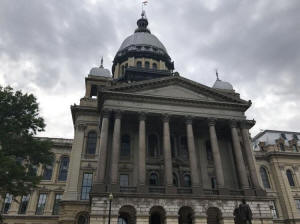Despite taxpayer-funded stimulus, Illinois’ economy slow to recover
 Send a link to a friend
Send a link to a friend
 [November 30, 2021]
By Greg Bishop [November 30, 2021]
By Greg Bishop
(The Center Square) – Illinois’ economy is
among the worst performers during the pandemic and an economist says
it’s clear as to why.
Despite 40% higher taxpayer-funded stimulus last year than the year
before, Illinois’ GDP decline was 13th worst in the country and it is
expected to grow slower than the rest of the country.
The U.S. Bureau of Economic Analysis regional quarterly report on gross
domestic product and personal income shows for all of 2020, Illinois’
gross domestic product, or GDP, contracted by 5.1%.
While that wasn’t as bad as Hawaii’s drop of 10.8%, Illinois Policy
Institute Chief Economist Orphe Divounguy said Illinois was among the
worst.
“Illinois had the 13th worst economic contraction in the country,”
Divounguy said. “What we learned really quickly is that states that had
the most intense or severe lockdowns had the largest drop in economic
activity.”
Gov. J.B. Pritzkers’ stay-at-home order that lasted more than two months
and subsequent throttling of other economic drivers through all of last
year prolonged the impacts.
Another economic indicator from the BEA report is Illinois’ personal
income increased during the pandemic by 1% for all of 2020. That was
driven by a more than 40% increase in government stimulus through direct
payments and enhanced unemployment benefits.

[to top of second column]
|

'
The Illinois State Capitol in Springfield, Illinois.
John Spataro | Watchdog.org

Despite that, Divunguy estimates Illinois is $17 billion below where
trends suggest the state should be producing.
Looking ahead, Divounguy said slow growth in the first two quarters of
this year shows troubling signs.
“We expect when the [third quarter] numbers come out for Illinois, the
growth rate for Illinois’ economy would have slowed down as well,” he
said.
To speed up the state’s recovery, Divounguy said the state needs to
follow what works in states with more accelerated expansion.
“That is the prescription, getting people back to work means
deregulation, it means lowering the tax burden, especially at a time
when we’ve received enough federal stimulus,” Divounguy said.
Federal taxpayers sent Illinois in total across all sectors public and
private more than $160 billion.
Divounguy said something else that’s clear is what’s behind states
rebounding faster.
“They’re states with the fewest business regulations on the books,”
Divounguy said. “They are states that are friendly to business.”
Kiplinger recently ranked Illinois as the least tax-friendly state in
the nation. |